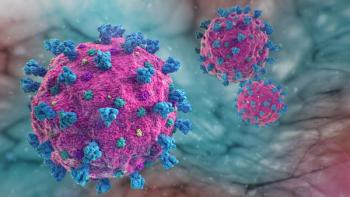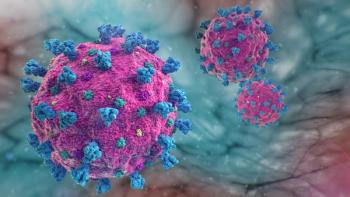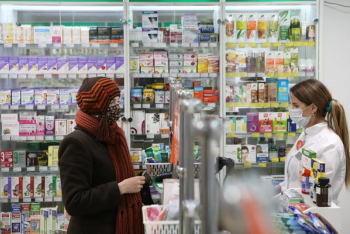
The authors of the study suggest that any patient with HZ should be tested for COVID-19, even if the individual has mild symptoms or no history of upper respiratory symptoms.

The authors of the study suggest that any patient with HZ should be tested for COVID-19, even if the individual has mild symptoms or no history of upper respiratory symptoms.

Caroline Carney, MD, MSc, FAPM, CPHQ, chief medical officer of Magellan Health, a board-certified internist, and a board-certified psychiatrist, discusses the impact of trauma and stress on overall health during the COVID-19 pandemic.

The study is most comprehensive analysis to date of changes in hospital mortality throughout the pandemic, reviewing data on more than 20,000 patients admitted to hospitals for COVID-19 over 9 months, according to the Institute for Health Metrics and Evaluation at the University of Washington.

IQVIA researchers saw a sharp uptick in medication usage shortly before the COVID-19 pandemic began, followed by a steep fall in the first few months of the pandemic.

The AHA released a report to provide guidance about CVST, TTS, and VITT after receiving the COVID-19 vaccine.

When looking at the COVID-19 variants, it is increasingly necessary to assess them in terms of the mutations embedded in the variants themselves.

In addition to overall concerns about COVID-19 vaccines patients may have stronger fears about the second vaccine dose since it is often accompanied with more adverse effects.

During a session at the NACDS 2021 Annual Meeting, Scott Gottlieb, MD, former commissioner of the FDA from 2017 to 2019, provided an overview of where the country is heading in its response to the COVID-19 pandemic.

The authors of the study said this finding suggests that data from health care workers could be used to estimate the severity of future viruses more quickly.

The proposal would also distribute 1000 additional physician residency slots to hospitals in rural areas in an effort to address gaps in equitable care.

Experts Suzanne Soliman, PharmD, BCMAS, and Sally Arif, PharmD, BCPS, BCCP, discussed their experiences and advice for handling vaccine hesitancy in part 1 of a 2-part interview on the topic.

The COVID-19 pandemic has been linked to a 44% increase in insomnia disorder among health care workers at a medical-school affiliated health system, according to a study published in the Journal of Clinical Sleep Medicine.

Due to the success of its COVID-19 vaccination clinics hosted at sites such as churches and community centers across the country, Walgreens announced that it will now activate mobile clinics in Chicago, Illinois.

Although many patients are hesitant about the COVID-19 vaccines, Humphreys said pharmacists are perfectly positioned to provide education.

Pharmacy Times spoke with Chris Antypas, owner of Asti’s South Hills Pharmacy in Pittsburgh, PA, about the critical role community pharmacists play in bridging the education gap and ensuring access to the COVID-19 vaccine.

The finding raises the potential for repurposing available drugs as COVID-19 antivirals for cases in which a vaccine is not practical or effective, according to RPI chemistry and chemical professor Gaetano Montelione.

Caroline Carney, MD, MSc, FAPM, CPHQ, chief medical officer of Magellan Health, a board-certified internist, and a board-certified psychiatrist, discusses the correlation between heart health and mental health.

High demands on the health care system from COVID-19 may mean a permanent shift in the landscape.

The response to COVID-19 has elucidated the challenges and opportunities with pharmacy-provided services delivery.

Although the CDC and FDA have lifted the pause on Johnson & Johnson’s COVID-19 vaccine, Humphreys said the vaccine now comes with a warning label, and ongoing safety reviews will be paramount to ensure its continued safety.

If gut-imprinted immune cells are diluted in comparison to immune cells triggered by other parts of the body, there could be implications for the oral-based COVID-19 vaccines currently under development.

The efforts of pharmacists to keep their doors open during the pandemic, build COVID-19 testing sites, and prepare for and administer COVID-19 vaccinations took extraordinary investment and determination.

In addition to altered supply chains and medication access during the early months of the pandemic, the report predicts long-term changes for both COVID-19 survivors and those with chronic illnesses.

A metanalysis published in SN Comprehensive Clinical Medicine found that administering the therapies early in a patient’s treatment could be associated with better outcomes.

The data found fewer adverse effects in the general population with both the Pfizer-BioNTech and AstraZeneca vaccines than reported in trials.